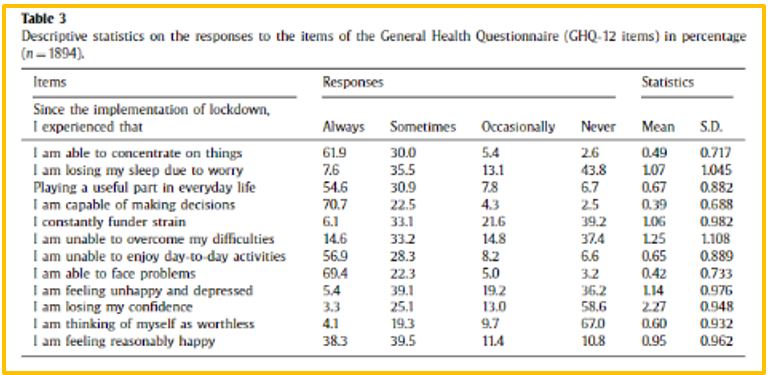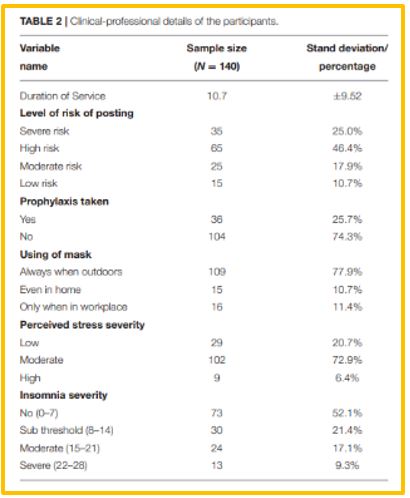Franklin D. Roosevelt (FRD) on different platforms, supported the Indian Freedom Struggle making the abovementioned…
Psychological Implications of Covid-19: Lockdown and Beyond
PSYCHOLOGICAL IMPLICATIONS – LOCKDOWN AND AFTERWARDS
Due to Covid-19, people saw an acute change in their behaviour and mental health during the lockdown period as well as after it, while moving towards normalcy. As mentioned, as a result of lockdown, people experienced emotional/mental trauma due to prolonged confinement in a ‘hostile’ home environment. Moreover, the problem got aggravated with the lack of communication and interaction with friends and teachers. Although there was an online medium to contact friends and teachers, yet the medium is not that comfortable during the initial days as well as even today meeting someone offline has a major psychological impact than online. Moreover, as a result of psychological implications, the student’s suicide rate increased drastically and the primary reasons behind this were study-related pressure, apprehensions about attending online classes, lack of facility to attend online classes, the financial crisis in the family, overuse of social media, fear of contagion, parental pressure, domestic violence and substance abuse.

In Table 10, the responses are collected and arranged of 1894 recipients to whom a questionnaire was sent to mention what they felt during the lockdown. To which, most of them answered (~ 64%) that they were unhappy and depressed. Moreover, nearly 95% was unable to enjoy day-to-day activities.

The Covid-19 pandemic and lockdown haven’t been kind to our student population. They are amongst the worst hit emotionally – 58% of Indian college students experienced a significant increase in their stress levels and severe deterioration in their emotions of anger, anxiety, loneliness, hopelessness, and happiness.
Another survey by UNICEF and Gallup with 20,000 children and adults in 2021 showed that only 41 per cent of the young people between 15 to 24 years of age in India said that it is good to get support for mental health problems. As per the survey, India was the only one of 21 countries where only a minority of young people felt that people experiencing mental health issues should reach out to others.
Though the lockdown came to an end, even today people are suffering serious mental health issues such as anxiety, stress, disorders, et al. Moreover, a study conducted by the Washington University School of Medicine in St. Louis stated that despite being initially a respiratory virus, long COVID-19 can affect nearly every organ system in the body. They identified newly diagnosed major health issues that persisted in COVID-19 patients over at least six months and that affected nearly every organ and regulatory system in the body.
Moreover, the healthcare workers have suffered much greater harm than the individuals residing in the ‘hostile’ environment at their homes. A study conducted on 140 medical practitioners showcased that they suffered through anxiety, stress, insomnia, fear, irritability, hopelessness, et al. (as shown in Table 11).

The study concluded that the different categories of healthcare workers have experienced varied mental health problems owing to their heterogeneous socio-demographic backgrounds.
Chapter 7: Summary of Findings
WUHAN VIRUS AND ITS IMPLICATIONS
- The virus has led to a drastic increase in the stats of suicide rates. The primary reason behind the increase in suicide rates was prolonged confinement inside a ‘hostile’ environment of the home back with a communication gap between friends, families and dear ones.
- The suicide rate among the students shown a major surge due to the reasons mentioned above along with study-related pressure, apprehensions about attending online classes, lack of facility to attend online classes, the financial crisis in the family, overuse of social media, fear of contagion, parental pressure, domestic violence and substance abuse.
- The graph showcasing data about domestic violence also saw an upsurge during the lockdown period due to an increase in anxiety, stress, et al. backed with financial constraints, job insecurity, and economic burden.
- Though there is no data on marital rape during the lockdown as it is not considered a crime in India, the studies and researches have suggested that with a critical jump in sexual harassment issues under Domestic Violence concerns, it would have been increased as well.
- Due to Covid-19, the world saw an immediate shift from offline to online protocols. This shift also raised serious concerns in the society as privileged people were able to afford the same while underprivileged and downtrodden strata suffered.
- There was a pre-existing digital divide in India which got aggravated by the Wuhan virus. As per the statistics, men have more access to smartphones/mobile phones and the internet than women. The underprivileged children due to online education also suffered as their parents were unable to afford smartphones and even if they were, then they were unable to spend money again and again on data packs.
- The Covid-19 also lead to an increase in cybercrime cases resulting in grave violation of people’s right to privacy as companies failed to buttress their system with new technological cybersecurity measures, which resulted in data and security breaches. A recent example was of MobiKwik data breach.
- The psychological implications posed by the Wuhan virus are of long-term implications and a plethora of studies have already showcased the same in their research. Thus, though Covid-19 has gone, we are yet to get back to normalcy as people still have fear, anxiety, depression, et al. instilled in them as a result of coronavirus.
- The Wuhan virus has also taken a crucial toll on the mental health of medical practitioners. A study conducted on 140 medical practitioners showcased that they suffered through anxiety, stress, insomnia, fear, irritability, hopelessness, et al.
SUGGESTIONS AND RECOMMENDATIONS
- Steps taken by the Government of India: Though the Hon’ble Ministry of Health and Family Welfare came up with a comprehensive guide to deal with the mental health concerns during the pandemic, people were hardly made aware of the same.
- Yoga and Meditation: It is high time and we shall get back to the ancestral roots of SANATANA DHARMA. There is a plethora of studies, research and understandings available that oft-mention that Yoga and Meditation encourage mental and physical relaxation, which helps in reducing stress and anxiety.
- Increase Awareness: The people were hardly aware of the mental health issues and shame of talking about the same to others as they worry about “Log Kya Kahenge?” Thus, the pandemic has given us a chance to ponder over the issue and uproot the stigma attached to it by making people conscious about their mental health. In cyber arena, the government shall promote cyber hygiene and cyber ethics by including it as a subject in the school curriculum as the ongoing as well as upcoming ages are ‘Digital Ages’ and sooner or later the Government has to take cybersecurity actions, thereby the sooner the better.
- Stand against Psychological Implications: The individual suffering from mental health complication(s) must come up of the four walls and tell the society i.e., his friends, family, and loved ones of the same that would surely help him in getting away from the clutches of these psychological issues. For instance, it is highly reported and oft-stated that Corporate law Firms in India still suffer from a feudal hangover and burden their employees with workloads, deadlines, overtime, etc., thereby the need of the hour is that the employees shall come forward and abandon such firms until the Legislature/Executive/Judiciary took any action or the firms themselves.
- Steps to be taken by the Government: Various findings suggest that the mental health infrastructure as well as cyberinfrastructure of India is in shambles as there are merely 43 mental health hospitals in the country while in 2020, the country reached all-time high 50 per cent cyberattacks penetration rate. Thus, a more systematic commitment to mental health and cybersecurity issues is needed from the side of the Government. For healthcare sector, the Government shall perform by increasing awareness, advocacy, per cent of GDP share in the health sector, buttressing the mental health infrastructure of the nation and may more. For cybersecurity, the government shall promote cyber hygiene, invest more in cyberinfrastructure (i.e., both computer source systems and cyber experts’ manpower) of the nation to buttress cybersecurity, et al.
Author: Kaustubh Kumar, in case of any queries please contact/write back to us via email to chhavi@khuranaandkhurana.com or at IIPRD.
[i] Asian Journal of Psychiatry
[ii] India Today



